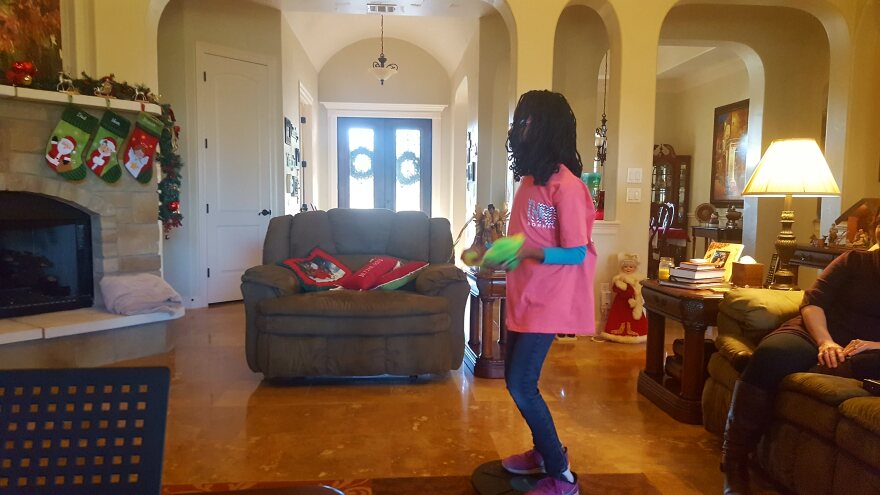Beginning Thursday the State of Texas will cut the amount it pays to therapists who treat some of the state’s most vulnerable children. Families are now worried they’ll lose care that is teaching their children important life skills.

In the living room of her family’s home outside of Austin, 9- year old Briana Dupuie smiles broadly as her physical therapist tosses a fuzzy yellow tennis ball and Briana tries to catch it.
Briana is conscious of her new audience and shows off a little as she balances the tennis ball on a giant spoon while walking in between a series of cones.
Dena Dupuie says that before she and her husband adopted Briana, the little girl was the victim of shaken-baby syndrome and suffered a traumatic brain injury.
“She lost all of her ability to talk, walk, crawl and move her entire right side of her body," Dupuie explains.
Now Briana needs speech and physical therapy that’s provided by several therapists who make house calls. The state through Medicaid pays,
But last year lawmakers made an 11th hour cut to the state’s budget. Included was a reduction in the fee paid to in-home therapists including the ones who treat disabled children like Briana.
State Sen. Charles Schwertner is a Republican from Georgetown who pushed for the cuts which will affect an estimated 60-thousand special needs children. Schwertner says a Texas A&M study showed therapists were overcharging the state.
“I think everyone agrees the state has a responsibility to provide these life-changing therapies to the children of families that depend on them, but at the same time taxpayers shouldn’t be asked to pay for these services at rates that are at twice the costs of commercial market or of comparable states," Schwertner says.
A&M later said it’s study was flawed. But the cuts have gone into effect anyway.

Dena Dupuie was among the parents who unsuccessfully sued the state to prevent the cuts in reimbursement rates. Now she wonders if the therapists her daughter needs will stay in Texas where they’ll earn far less than in other states.
Jimi Ellis says many won’t. He’s the the CEO of the San Antonio Circle of Care Therapy.
“Those people are probably dropping from an average salary of $95-thousand, the supervisors to an average salary of $65 to 70-thousand at best," Ellis explains.
Dupuie says it would cost her family $20,000 to privately pay for the services Medicaid now covers. Having care at their home is the best option.
“For my child for instance who has a traumatic brain injury, doing things around the house such as brushing her teeth correctly, making her own breakfast, getting herself dressed, these aren’t things that can be done at a brick and mortar location. She needs to know daily life skills," Dupuie explains.
She says driving her daughter to numerous therapy centers from their rural home would be nearly impossible.
“So we would have to Dell Children’s Hospital which is an hour away, Dripping Springs for another therapy and Buda for another. Well that is difficult to do when you are schooling a child," Dupuie says.
In an interview with the Texas Tribune House Speaker Joe Straus, OF San Antonio , said reversing the cuts will be a top priority when the Legislature begins meeting in January.
“Let me say that I believe the approach was well-intentioned, it did not work and it will addressed in our supplemental budget. It means that maybe we made a mistake and I believe you’ll see use address it," Straus says.
But it’s unclear whether other legislative leaders will follow suit. The Lt. Governor has not promised to reinstate the therapy money.
Which leaves parents like Dena Dupuie wondering how she’ll be able to find and afford the care that is helping her daughter adapt and grow.



